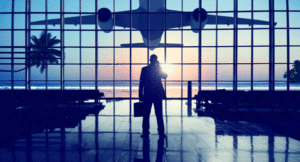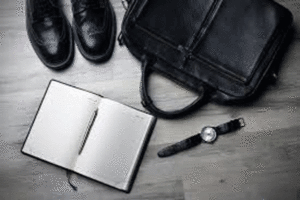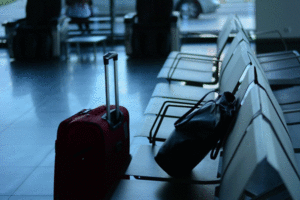Traveling with a Purpose

Published on March 30, 2018, at 8:13 p.m.
by Allie Binford.
Cellphones and the internet have made it easy to connect with people around the globe, for business or for personal reasons, but face-to-face communication is still the most effective point of contact. In business, it is easy to default to videoconferences, phone calls or even emails for meetings to save time and money, but meeting in person can make a lasting impression that is more effective than any form of digital communication.
Setting up these face-to-face meetings often calls for business travel – an opportunity that most graduates or new hires are likely wildly unprepared for. There are three main differences in business and leisure travel: You have places to be, you’re on your own, and you have to plan ahead.
Traveling for business is traveling with a purpose.
When on a business trip, you have scheduled meetings or interviews that you must attend at certain times and in specific places. That is your purpose for being in whatever new locale you find yourself, so being on time and prepared is your top priority.
Kaitlyn Krejci, now a staffing services associate at Google, had to fly out to Austin, Texas, for her interview with Google. Being entirely new to the city, she had a lot of work to do pre-interview to make sure she was fully prepared for her 24-hour trip to a new city.
“I had to have an exact plan to be on time,” Krejci explained. It was nerve racking to figure that out in a new city, but rideshare services can be lifesavers. I think if I had rented a car I would have been lost. The key is to ask a lot of questions. I reached out to my recruiter, and others involved in the process of setting up my interviews. I wasn’t afraid to ask those questions of people who would know the answers.”
Asking questions about your travel itinerary is essential to effective corporate travel, especially on your first trip. You need to know what your responsibilities are before you leave the ground.
Brie Strickland, an associate manager of influencers and music at Southwest Airlines, took her first work trip to Brooklyn, New York, for a mommy blogger event in 2016.

“Just knowing the flying procedures, what to expense, what not to expense, and overall expectations can be overwhelming, but it’s important for new business travelers to lean on more seasoned employees for guidance. Be confident but also be humble enough to ask for help. No one expects you to be an expert, so reach out to co-workers or staff or even your own network for advice,” Strickland said.
Taking the initiative to ask questions and prepare for your trip can make the whole journey smoother. Using the connections you have and opportunities available to you through your company can be instrumental in helping you plan a successful and fulfilling trip.
Some companies, like Google, have new member programs and trainings that help you get connected with your co-workers, or Nooglers as they call them, and get acquainted with the company. Keeping these contacts on hand can be helpful when you have questions about the job or even if you’re just looking for a restaurant recommendation.
The notion of traveling with a purpose is relatively uncharted territory for new members in the workforce who are used to traveling with more time and flexibility.
But that doesn’t mean that you can’t have fun.
If you plan ahead, you can schedule your time around your work requirements and make the most out of a trip to a new place.
“I’m a big fitness and food fan, so I like to plan out how I’ll spend my down time on my business trip by picking out one fitness class and a great little local restaurant or coffee shop. I think it’s important to mix a little pleasure with business — it makes it feel less than like work and more like an adventure,” Strickland said.
Taking a quick excursion can be an opportunity to meet new people in your company. When Krejci was in California for training at the GooglePlex in Mountain View, California, she knew she would have a spare day before flying back to Austin.
“Rather than staying at the hotel, I reached out to my manager, knowing there was a San Francisco office, and asked if I could work from there for the day,” Krejci explained. “So I was able to work in a new space for half of the day, and spend the rest of it exploring the city. I still got back to Mountain View in time to get ready for my flight, and I even saw the Golden Gate Bridge.”
Making the most out of business travel requires lots of planning ahead, which includes packing. If you plan out exactly what you will be doing on your trip, you won’t have to worry about over-packing for if-and-when scenarios.
Strickland’s advice for packing is less is more.
“I think the most important part about business travel is being purposeful in what you bring while focusing on minimizing all the moving parts of your travel. There’s a fine line between wanting to be prepared and packing half your closet and being that person with a checked bag for a day long trip. I’ve never checked baggage for a business travel and rarely do it for leisure travel,” Strickland said.
In the end, business and leisure aren’t always mutually exclusive.
“Honestly the biggest difference is that work travel has certain scheduled obligations and leisure travel has more flexibility. I find I actually sometimes get more fun in during work trips because I am so mindful of my work obligations and schedule that I really make the most of my time,” Strickland said.
If you’re smart about your scheduling, you can make your business travel work for you.
“Go with a plan first; don’t just go and hope it all works out. You won’t use your time wisely if you just wing it,” Krejci said.

Consulting colleagues, using apps like Yelp and Uber, and contacting your personal network can make the world feel a little smaller and a little less scary. The digital age may call for more intentional face-to-face interaction, but it also makes travel a lot less daunting.
“Hands down, the greatest lesson I’ve learned from traveling in general is the ability to be flexible and resourceful,” Strickland said.




